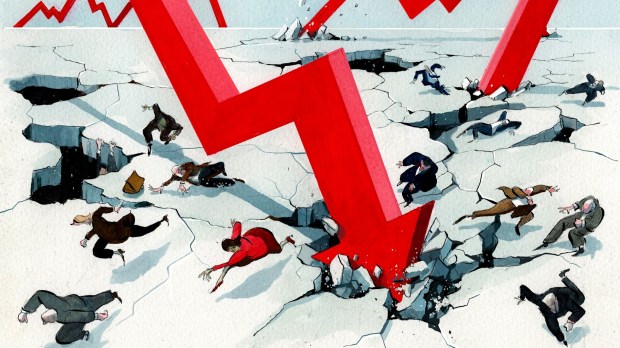The season of high-street banks’ annual general meetings is with us and I urge you to turn up and make trouble. When I say ‘you’, I don’t mean the likes of New York ‘activist’ Edward Bramson — who holds 5 per cent of Barclays and may or may not agitate for a boardroom seat at next Tuesday’s gathering. I mean you, dear reader, the modest shareholder-customer who suffers rotten service, too-frequent computer glitches and negative returns on savings while directors on the platform congratulate themselves on the spurious performance measures that underpin their bonuses. This is your annual chance to make them squirm.
One topic you might like to tackle them on is the continuing tide of branch closures, on which many of you expressed strong views to me early last year. Your combined 10,000-word overview was forwarded to the Banking Standards Board and UK Finance, the umbrella trade association for the sector, to no avail. Since then the number of ‘big four’ branches has reduced by 1,000, with more closures to come from Lloyds (AGM: 24 May) and RBS (date unconfirmed), plus an additional threat of the potential loss of 10,000 cash machines because of a cut in fees paid by banks to ATM operators.
The emphasis of this debate has shifted from the inconveniences for personal customers (who are gradually migrating online, faute de mieux) to the plight of small businesses, left with nowhere in town to pay in or deal with foreign transactions or talk about credit. This absence of banking facilities, alongside rising business rates and competition from discounters, charity shops and the internet, is deepening the high-street desolation that is detrimental to everyone’s quality of life. Arguably — because it damages business performance and increases uncertainty — it’s also a factor in the UK’s chronic low-productivity problem.
For all their talk of ‘consulting communities’, banks have failed to acknowledge the ‘social licence’ that attaches to the free money we lend them on current and deposit accounts. But there’s still time, for example, to embrace the proposal in our readers’ report that the last bank branch in any vicinity should become a multi-bank ‘hub’ offering services for all — an idea the SNP is now promoting to avert much of Scotland becoming a bankless desert. Get down to the AGM, ladies and gentlemen, and get ready to shout at the chairman.
Canadian dame
‘Who’s the most admirable Canadian in London?’ sounds like a variant of that old party–game favourite ‘Name a famous Belgian’ — but is probably easier to answer. Some will insist on former long-time Toronto resident Meghan Markle, even though she was born in LA; others might favour Bank of England governor Mark Carney, though his pronouncements seem to become even duller and more cautious as the end of his tenure (in June next year) comes in sight. But for me, the winner by a distance is Royal Mail chief executive Moya Greene, who has just announced her retirement in September after eight years in post.
Under her leadership, Royal Mail has not only been privatised (it wasn’t her fault that the 2013 share issue was mispriced by City advisers to Vince Cable, the minister responsible) but transformed from a relic of bygone days to a market leader alongside Deutsche Post and La Poste of France. Her most visible success was a series of pay settlements that kept the strike-prone Communication Workers Union largely on side during a restructuring that reached the ‘last mile’ of every delivery route, adjusting both for declining letter volumes and an e-commerce-driven surge in parcel traffic.
Changing delivery patterns and sharply rising stamp prices may have displeased many consumers, but my man in the sorting office emails to say: ‘Moya has kept the Royal Mail machine going, fixed the core, made it make money, and found its future — and she’s absolutely worn down by the relentless slog.’ Her retirement is well deserved, and I hope it comes with a damehood.
Knight errant
Will Sir Alan Parker surrender his knighthood? The 2014 New Year Honours list described him as ‘Founder and Chairman, Brunswick Group LLP and Chair, Save the Children’ and said the award was for ‘services to Business, Charitable Giving and Philanthropy in the UK’. So we might deduce that at least half of it was in recognition of the Save the Children role from which he has stepped down, having been accused of failing to deal appropriately with allegations of sexual abuse against executives of the charity.
As it happens, I watched Parker collect his gong from the Prince of Wales at a Buckingham Palace investiture: his confident, almost casual air (no morning suit for him) was in marked contrast to the nervousness of lesser honorands. If that sounds hubristic, I suspect that Brunswick, the PR firm he founded — which is said to represent a third of all FTSE100 companies and to have avoided the dodgier sort of clients that tainted its former rival Bell Pottinger — will easily ride out this storm. But there’s a precedent for giving back a knighthood when the public mood turns against you: it’s what former HBOS chief James Crosby did in 2013, after MPs accused him of sowing the seeds of his bank’s destruction. A shrewd PR adviser might whisper to Parker that he’d be better rebuilding his business career without the handle that’s a reminder of his fall from grace.
Making whoopee
I was clearly right when I wrote last week that there isn’t much feelgood factor around: only two of you emailed to contradict me. One pointed out that over-55s are making whoopee with cash unlocked from their homes in equity release loans, amounting to almost £10 million a day — double the rate of two years ago and happily replacing the fountain of PPI compensation that has begun to tail off. The other said simply his reason to be cheerful was that ‘after Salisbury and Syria we’ve surely seen Peak Corbyn’.
Got something to add? Join the discussion and comment below.
Get 10 issues for just $10
Subscribe to The Spectator Australia today for the next 10 magazine issues, plus full online access, for just $10.
You might disagree with half of it, but you’ll enjoy reading all of it. Try your first month for free, then just $2 a week for the remainder of your first year.















Comments
Don't miss out
Join the conversation with other Spectator Australia readers. Subscribe to leave a comment.
SUBSCRIBEAlready a subscriber? Log in